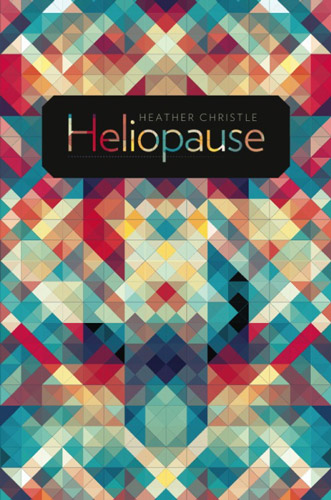Heliopause
In Heather Christle’s fourth and newest collection of poems, Heliopause, speakers acknowledge boundaries, and then promptly confront them. The title itself pertains to “the boundary between our sun’s sphere of influence and interstellar space” (via book jacket). These poems acknowledge some of history’s haunting topics—the aftermath of 9/11, the events upon the slave ship Zong, the 2012 Aurora Shooting—and yet the collection as a whole manages to balance out the darkness with a voice that is full of wit and refreshing candor. This collection showcases the versatility of Christle’s creative talent, and maintains a sense of balance and composure amidst “the terrified world.” In Heather Christle’s fourth and newest collection of poems, Heliopause, speakers acknowledge boundaries, and then promptly confront them. The title itself pertains to “the boundary between our sun’s sphere of influence and interstellar space” (via book jacket). These poems acknowledge some of history’s haunting topics—the aftermath of 9/11, the events upon the slave ship Zong, the 2012 Aurora Shooting—and yet the collection as a whole manages to balance out the darkness with a voice that is full of wit and refreshing candor. This collection showcases the versatility of Christle’s creative talent, and maintains a sense of balance and composure amidst “the terrified world.”
Many of Christle’s poems here comment on boundaries. The first poem, “A Perfect Catastrophe,” begins, “To have stood midfield among the vast and livid green / and never heard the grasses take their vow of silence / is experience, not evidence.” Already, readers find themselves in the middle of something expansive, an image that is revisited later in the collection. In “I Am Glad of Your Arrival,” the speaker observes, “The sky is everywhere / at once like a big movie.” Momentarily, the sheer vastness seems to invite exploration, but the speaker concludes, “there is uncertainty enough / to hold me still.” There is a strange uncertainty of living within the vastness of time and space. The sixth poem in a series of poems titled “Dear Seth” explains:
For a long time they did not know
if Voyager had crossed the heliopause
and we lived
in the strange interim
of an event perhaps having occurred
This sense of living within a state of unknown permeates throughout the collection seamlessly. The uncertainty is “strange” and perhaps unsettling.
The epigraph to the collection comes from W. S. Graham and begins with “What is the language using us for?” The poems in Heliopause seem to explore this question, and comment on the alphabet, syntax, and even the very first telephone conversation. In Christle’s notes to her poem “Vernon Street,” she explains, “[ . . . ] the first words to be spoken and understood over the telephone were in fact “Mr. Watson—come here—I want to see you.”’ Despite the technological breakthrough of the first successful telephone conversation, there was evidently an immediate desire to close the gap, and to be physically near each other. In “How Long Is the Heliopause,” the speaker acknowledges a lapse in communication:
[ . . . ] I can hear nothing but the brightness
of the field
where I am waiting for the warm chest
of my husband
for its occasion
and if they say a word now
it would take years for me to know
There is a gap present between the conception of “a word” and the eventual reception of it. Much like the sentiment expressed in “Dear Seth,” the speaker is held in the interim of a communication’s conception and reception.
There is a slight, perfected wit present throughout several of the poems. The poem “Aesthetics of Crying” begins innocently, “You meet someone and later you meet / their dancing / and you have to start again.” Later on, the speaker examines herself in the act of crying:
I have cried at times
for so long that I have moved the activity
in front of the mirror
out of curiosity
The information I gathered there remains
thus far unused
but let the record show
my horrible face
Crying is typically the bodily response to sadness, yet the speaker’s analytical reaction to her own outpouring of grief showcases a refreshing display of curiosity and inquisitiveness. Later, in the poem “Optioned,” the speaker claims, “I was born with a wooden spoon / in my ass / Imagine my embarrassment!” What begins as a play on words of the old adage “silver spoon in the mouth” becomes a ridiculous—albeit, comical—statement on finance-related stress. Christle’s ability to weave humor into the stressors of everyday life is pleasantly unpredictable.
The book’s elegiac final selection, “Poem for Bill Cassidy,” ends by acknowledging the limits of communication between the living and the dead:
How long do we wait before we say
there’s no reply
given how slowly
these black words will drift to reach him
given all this thick light
given how time
Heather Christle’s Heliopause acknowledges these limits, but refuses to be entirely bound by them. Much as Voyager journeys to transcend the boundaries of space, these poems assess the boundaries of communication then keep on going. Christle’s versatility, creativity, and candor combine to create a collection as beautiful as it is honest.





